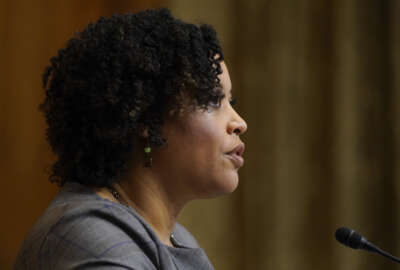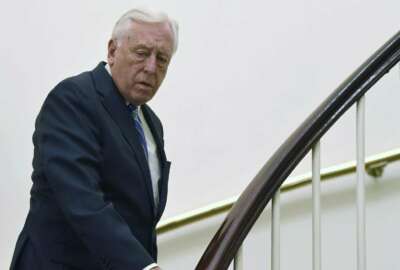

The Senate approved $650 million for agency cybersecurity upgrades, and another $350 million for the U.S. Digital Service and the Federal Citizen Services Fund to...
You could see the momentum to finally push real funding to the Technology Modernization Fund building all last week.
Three nominees for key positions at the Office of Management and Budget specifically mentioned the need to put serious money behind federal agency cybersecurity and IT modernization efforts. Senate lawmakers did more than casually mention it or offer to submit questions for the record.
A draft of the Senate’s version of the American Rescue Plan — labeled a manager’s amendment — leaked out finally offering some specifics: $1 billion for the TMF, $650 million for cybersecurity and another $350 million for other related IT modernization efforts.
But it wasn’t until the Senate Budget Committee released its initial version of the bill did reality set in. Real, impactful funding for the TMF was closer than ever to crossing the finish line.
By March 6, the Senate sealed the deal with a vote of 50-49 passing the American Rescue Plan with the $2 billion for federal technology and cybersecurity efforts.

“Having $1 billion dollars in the Technology Modernization Fund is a good first step and will be critical to helping address many of the common challenges still hampering effective IT transformation across the government, such as identity management, secure data sharing, leveraging AI and other emerging technologies to enhance citizen service delivery and expanding critical cybersecurity shared services to combat persistent threats,” said Matthew Cornelius, the executive director of the Alliance for Digital Innovation, an industry association, and a former senior technology and cybersecurity advisor at OMB, in an email to Federal News Network. “Because these funds are being provided as part of this relief bill and should be used to deal with immediate challenges, it is incumbent upon OMB and the General Services Administration to use the authorities they have under the MGT Act to suspend repayment and quickly make targeted investments to the most high priority projects in one or more agencies.”
The TMF and other funding are not a done deal. The House still must pass the Senate’s version of the American Rescue Plan. That, however, is a strong likelihood given the House’s long-standing support of the TMF.
Once the House passes the legislation and President Joe Biden signs it into law, along with the TMF receiving $1 billion — it never received more than $100 million at a time — the Cybersecurity and Infrastructure Security Agency in the Department of Homeland Security would receive $650 million to shore up federal networks from cyber vulnerabilities, the U.S. Digital Service would receive $200 million and the Federal Citizen Services Fund would get $150 million.
The Biden administration called for $9 billion for the TMF and another $1 billion for cybersecurity and IT modernization efforts to address the “urgent national security issue.”
“The American Rescue Plan emphasizes the importance of modernizing federal information technology and bolstering governments’ cybersecurity. These investments in technology infrastructure and tools are an important down payment on helping to deliver modern and secure citizen services and critical networks. We commend the U.S. Senate for prioritizing this vital need and urge the U.S. House of Representatives to approve the measure,” said Jason Oxman, president and CEO of the IT Industry Council, in a statement.
ADI’s Cornelius added that while the initial funding is a great start, Congress and the administration must continue to work toward addressing the legacy technical debt.
“We fully expect that any forthcoming jobs package will include digital infrastructure and technology investments to spur economic growth and improve digital service delivery in both the public and private sectors,” he said.
In addition to the funding for the TMF and other cybersecurity and IT initiatives, the Senate bill included the extension of the Section 3610 authorities to let agencies pay contractors if they cannot work during the pandemic.
Industry associations pressed lawmakers to move the sunset date from March 31 to Sept. 30.
Professional Services Council president and CEO David Berteau praised the work of Sens. Mark Warner (D-Va.) and Marco Rubio (R-Fla.), the chairman and vice chairman, respectively, of the Intelligence Committee.
“With so much uncertainty around safe access to workplaces, now is not the time to let up on COVID-19 protections. If enacted, this extension will help the federal government continue to access the highly skilled, cleared and trusted contractor workforce needed to meet mission needs,” Berteau said in a statement.
National Defense Industrial Association also applauded the Senate’s passage of the 3610 extension.
“Extending 3610 and safeguarding the defense industrial base workforce is critical to our national security today and, more importantly, into the future,” said Hawk Carlisle, NDIA president and CEO.
The fact that the Senate is supporting $1 billion for the TMF means that OMB must do its part and figure out what their version of transparency looks like and offer 110% of it. This is the Biden administration’s big opportunity to reverse decades of neglect and mistrust, let’s hope for every agency’s sake they don’t revert to the actions of the last three administrations when it comes to communicating about the funding.
Copyright © 2025 Federal News Network. All rights reserved. This website is not intended for users located within the European Economic Area.
Jason Miller is executive editor of Federal News Network and directs news coverage on the people, policy and programs of the federal government.
Follow @jmillerWFED



